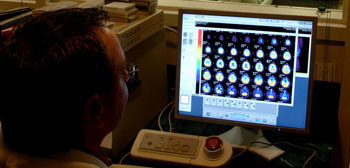New Non-Invasive PET Scanning Technique Used to Study Adult Neurogenesis
By MedImaging International staff writers
Posted on 10 Aug 2016
Scientists at a Japanese university have used a new PET scanning technique to study neuron proliferation in the hippocampal dentate gyrus.Posted on 10 Aug 2016
Neurogenesis in the hippocampal dentate gyrus is affected by depression but is also used in learning, and memory. The scientists focused on the subventricular and subgranular zones where neural stem cells create new neurons.

Image: PET imaging of adult neurogenesis may contribute to better diagnosis of depression (Photo courtesy of NIMH).
The study was carried out by scientists from the RIKEN Center for Life Science Technology (CLST; Hyogo, Japan). Neurogenesis can also be investigated using Magnetic Resonance Imaging (MRI) but this requires direct injection of tracers into the brain. For this study the scientists used the non-invasive PET technique and probenecid, a drug which can inhibit the active transport of molecules such as [18F]FLT, outside the brain. The scientists performed their research on laboratory rats.
Leader of the research team, Yosky Kataoka, said, "This is a very interesting finding, because it has been a longtime dream to find a non-invasive test that can give objective evidence of depression and simultaneously show whether drugs are working in a given patient. We have shown that it is possible, at least in experimental animals, to use PET to show the presence of depression and the effectiveness of drugs. Since it is known that these same brain regions are involved in depression in the human brain, we would like to try this technique in the clinic and see whether it turns out to be effective in humans as well."
Related Links:
RIKEN Center for Life Science Technology














